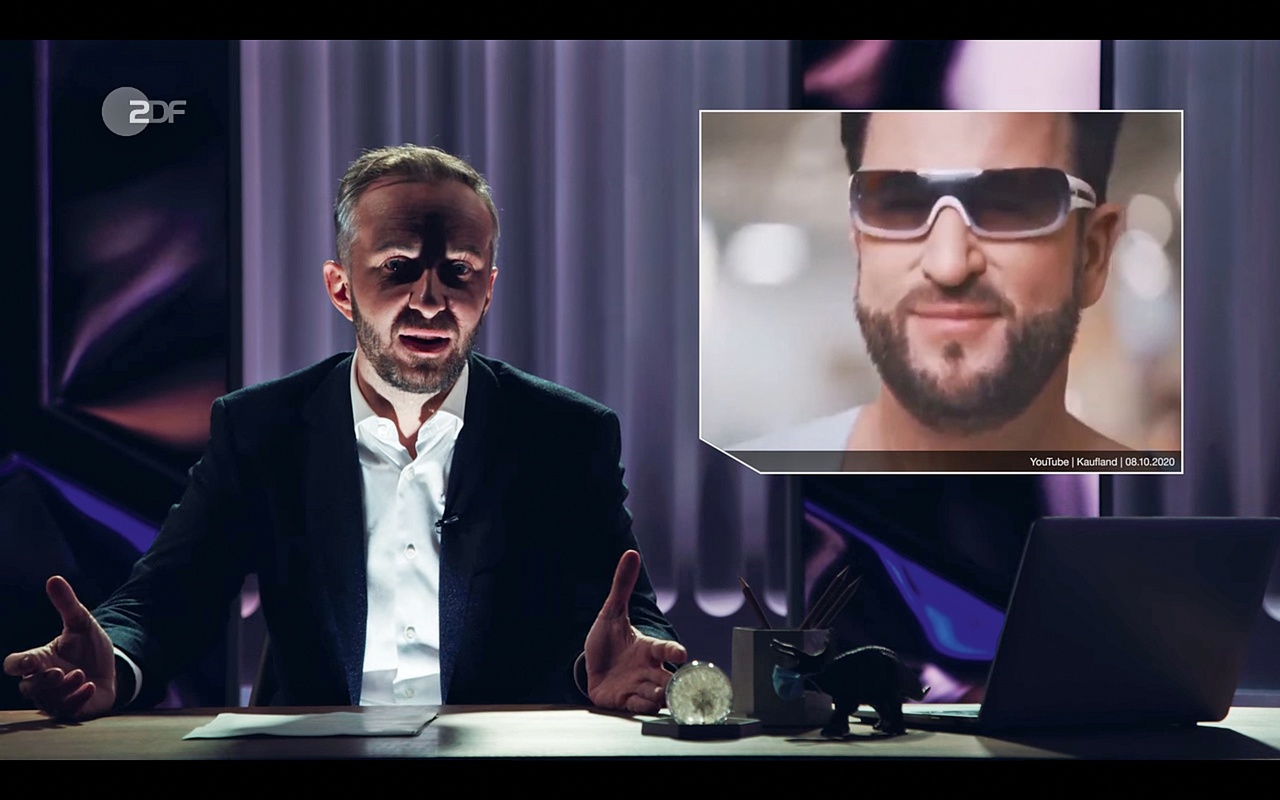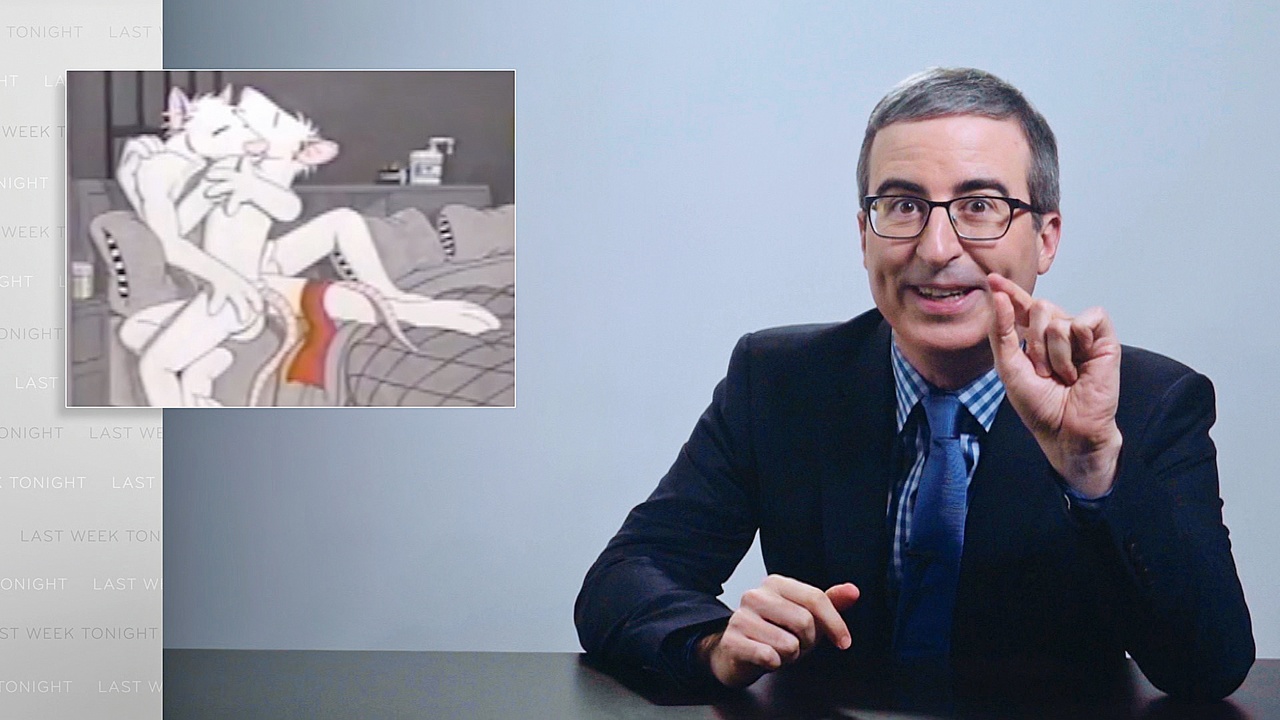PARODIES OF SATIRES On Jan Böhmermann

Jan Böhmermann in „ZDF Magazin Royale“, 2020, Filmstill
Welcoming viewers to the pilot episode of his new show ZDF Magazin Royale in early November 2020, Jan Böhmermann asked the studio musician for “strains suitable for a state occasion” before gazing into the camera and delivering the following solemn declaration:
Every Friday, ZDF Magazin will undertake a relentless investigation into the defects of our democracy. We will take independent, firm, and fearless stances – those were the opening words that Gerhard Löwenthal, ZDF Magazin’s creator and my predecessor on this show, spoke in 1969. And you have my promise that I will stand by these words, will carry on this tradition at ZDF Magazin Royale. Just with worse punchlines, occasionally I’ll flash my bare ass, and on Friday evenings we have an orchestra – the Rundfunktanzorchester Ehrenfeld.
The statement from Böhmermann, arguably Germany’s best satirist today, gets to the heart of his television project: it’s the travesty of a political magazine. The references to Löwenthal’s ZDF-Magazin were a staple of Böhmermann’s show from the start. The first intro to its previous incarnation, titled Neo Magazin Royale (2013), quoted the original’s 1969 theme tune, and after digressions into other classics from the public broadcaster ZDF (including the soundtrack of the detective series Ein Fall für zwei), the new show’s trailer once again features echoes of the historical jingle. [1]
There’s more to it than just Böhmermann’s enthusiasm for the vintage aesthetics of the television that he grew up watching (or the stories about the television that the late-night TV host Harald Schmidt grew up watching): the twilight, the ashtrays, the bulky microphones that were the hallmark of the talk show Böhmermann co-hosted with Charlotte Roche (2012). Böhmermann isn’t just the bridging figure who takes a genuine interest in the anecdotes of the Frank Elstner television generation (and is familiar with the characters who figure in them) while actually understanding social media, a rare combination that makes him the perpetual shoo-in for every single TV award. Unlike, say, Joko & Klaas, Böhmermann is a decidedly political TV personality, which is why the term satirist is still apropos. His version of a magazine on public television is what we should expect public television to be: the judicious use of funds to produce an information program that’s entertaining to boot.
When ZDF’s competitor broadcaster ARD added the aging Harald Schmidt’s Late Night Show, whose popularity was by then in terminal decline, to its lineup, it was buying back a celebrity it had made and allowed to be lured away by commercial networks. There was nothing political about Schmidt, or rather, politics came up in Schmidt’s shows only in one way, which Alternative for Germany’s Petr Bystron commended in the prologue before the inaugural ZDF Magazin Royale, an anthology of preemptive good wishes from people who don’t care for the show. Bystron came across as utterly bereft of any sense of humor, and it made good sense when he lauded Schmidt as someone who was both on the Right and funny. That Bystron would have no use for Böhmermann because the latter is a “left-winger” highlights the canniness of the ironic reference to Löwenthal’s ZDF-Magazin: Böhmermann certainly doesn’t mean to pay homage to a role model. Löwenthal, much like Karl-Eduard von Schnitzler, his antitype on East German TV, was an agitator, a Cold War–era propagandist, not a public educator. Even though he had suffered persecution as a Jew under National Socialism, Löwenthal was led by his deep-seated anti-communism to find his destiny in New Right networks – for the past fifteen years, the right-wing weekly Junge Freiheit has given out a journalism award named for Löwenthal. On the one hand, Böhmermann’s reference to Löwenthal points to a prototypical figure who embodied the strategic aggrievement over the putative ascendancy of the Left back when Alexander Gauland was still the protégé of the Hessian CDU leader Walter Wallmann. On the other hand, invoking Löwenthal serves as an antidote to the Right’s victimhood pose as modeled by Bystron: if left-wingers are making their presence felt at the ZDF, the Right used to own the place.
To see how deftly Böhmermann’s show navigates the culture wars instigated by the Right, consider Meine Oma 2.0 (My Granny 2.0), a remake of the WDR children’s choir’s satirical hit song about an Umweltsau (in which granny is reviled as a reckless polluter and an “environmental pig”). In the final days of 2019, right-wing agitators played up the WDR version into a scandal – and because the North Rhine-Westphalian minister president (Armin Laschet) and the director general of the regional public broadcaster WDR (Tom Buhrow) who faced this orchestrated indignation were either ill-informed or spineless, the ringleaders managed to exact an apology for a modestly funny parody of a modestly funny classic children’s song (“My Granny Rides Her Motorcycle in the Chicken Coop”).

„Last Week Tonight with John Oliver“, 2020, Filmstill
So the ZDF Magazin Royale skit featuring children, ostensibly from the same WDR choir, singing “My granny knows there’s no such thing as corona, corona, corona” does more than infuse the modestly funny children’s song about the granny in the chicken coop with fresh satirical energy. The clip actually makes the scandal itself the object of critical scrutiny by flourishing the words and signifiers fabricated over the course of the year by people who deny the reality of COVID-19. The infantile outrage over the WDR Umweltsau song was able to latch on, rather desperately, to the titular expletive: Didn’t it call everyone’s granny an “eco-pig”? This kind of vicarious umbrage at a perceived insult from people who are in the habit of insulting others with rather drastic expletives hits a wall in Böhmermann’s version – Meine Oma 2.0 is strictly descriptive. Here and there, the lyrics quote the lexicon of the self-described Querdenker (“lateral thinkers”) who protested the German government’s COVID-19 policies (“My granny’s not a sleepy-sheep” … “has a Telegram group chat, group chat, group chat”), and the choreography underscores the point when the radiantly smiling children double down on the line “My granny’s enjoying the après-ski in Ischgl, in Ischgl, in Ischgl” with bouncy dance-party arm gestures. The skit is funny also because the children’s manifest delight in performing together produces an awkward kind of beauty, capped by a cameo of Böhmermann himself sporting an avuncular smirk and delivering the punchline (“Since the day before yesterday, my granny’s been in a coma, in a coma, in a coma”) in a schmaltzy bass reminiscent of Ivan Rebroff.
In this way, Böhmermann’s clever cover – the arrangement, too, is considerably more ambitious than the Umweltsau version, candy-coating the whole confection with Last Christmas-style chimes – sets the record straight: with undisguised glee, it stages a thoroughly artificial innocence to match the actual innocence of the artless Umweltsau skit that was despoiled by the Right’s playing dumb. Meanwhile, the grins – on the slightly older kids’ faces and, above all, on Böhmermann’s own – are genuine and fully earned: Meine Oma 2.0 passes the problem with the scandal back to the Right, whose exponents, this time around, are actually offended because they feel that a setup intended to ridicule them takes them for a ride – but they can’t prove that it does, no matter how dumb they play. Vera Lengsfeld, a Gerhard Löwenthal prize winner, acknowledged that she didn’t have a leg to stand on (“in fact, I didn’t want to … speak out”) but didn’t let that stop her from publishing a legless complaint letter template (“feel free to use any of the following for inspiration”); by the third paragraph your head will be spinning so fast you won’t even know what the problem is anymore.
This and other clips illustrate the brilliance associated with Böhmermann’s media performance: parodying satire as a way to restore some justice in media-powered political skirmishes while also pointing out how abject Laschet’s and Buhrow’s responses a year ago were. Meine Oma 2.0 not only demonstrates how to do satire right today (namely, to be aware of the ways in which the baying and braying Right might spin it), it also performatively makes short work of the notion that anyone should apologize for the Umweltsau song – because no one needs to apologize for Meine Oma 2.0, which provides no targets of attack.
Böhmermann and his ZDF Magazin Royale would be unthinkable without the hosts of US satirical news shows – Jon Stewart, Trevor Noah, John Oliver – who modeled this reinvention of the traditional late-night show as entertaining public-service journalism. Quoting the relevant press coverage, a host sitting at a desk lays out the salient facts of a scandal that isn’t news as such (the Humboldt Forum, VW’s past, the leaders of the protests against COVID-19 policies ripping off their followers) – a kind of influencer for serious concerns, with excursions into the web’s meme cultures for added entertainment value. What sets Böhmermann’s satirical strategy apart is that he doesn’t just aim to package the matter under critical scrutiny better than the writers over at Der Spiegel with their sometimes lame gestures of investigative journalism, though they may well have uncovered the scandal in the first place. The parodic linkage between the Humboldt Forum’s looted art and the Remmo clan’s theft of the “Saxon treasure” is as obvious as it is brilliant, and yet it’s not something that magazine journalists would ever come up with. What’s more, Böhmermann’s show assembles its contents in such meticulously calculated constellations that the performative effect is compelling.
As in the case of Meine Oma 2.0. Or in the first episode of ZDF Magazin Royale. The intro to the latter was a witty send-up of conspiracy talk, easily recognizable as a reconstruction of the pop singer Michael Wendler’s public crack-up: a purported shutdown of all civilian social-media activities followed by an innuendo-laden announcement on Wendler’s Telegram account of his rebirth as a bright-eyed nutcase. The gag seemed tired but led to a major volley. In his activities on the instant messaging service, Böhmermann wasn’t content with making fun of a crooner who’d descended into echo chambers filled with conspiracy narratives. Rather, Böhmermann’s posts, replete with the genre’s requisite exclamation points and all-caps phrases, ultimately suggested the hope that a few of those hopped up on the unreason coursing through Telegram’s arteries might be receptive after all to the content that the segment on the show then performed. Böhmermann retraced the daft conspiracy plot charted by Wendler to the point where Bill Gates came into play, only to segue into an utterly un-conspiratorial and politically and economically knowledgeable critique of elites: what the media actually don’t talk about enough is economic inequality.
That’s not the kind of conclusion you arrive at by proposing to “talk to right-wingers” or “take citizens’ concerns seriously,” to quote the empty phrases of people who believe that hate dissipates when it’s given a platform. To detect inequality as the root of a problem, you need to investigate the defects of our democracy.
Translation: Gerrit Jackson
Notes
| [1] | A compilation of all intros to the various generations of the show, as well as the historical reference, can be found online: “Geschichte der ZDF Magazin Royale-Intros - Intro Collector Nostalgia,” YouTube video, 5:13, https://www.youtube.com/watch?v=YekXt2D7Bgw. |
